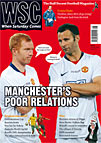 With Carlisle Utd facing an average away trip of 257 miles, their chairman is calling for League One and League Two to be merged on a regional basis. Roger Lytollis reports
With Carlisle Utd facing an average away trip of 257 miles, their chairman is calling for League One and League Two to be merged on a regional basis. Roger Lytollis reports
Carlisle United managing director John Nixon wants fixtures played on Christmas Day and supporters issued with rattles and rosettes as they enter Brunton Park. Well, possibly not. But many would hardly be surprised, having heard Nixon argue that the Football League’s bottom two divisions should be regionalised, 51 years after Division Three North and South were scrapped.
If Nixon has his way, Leagues One and Two will be merged then divided on regional grounds. Coming just a year after Carlisle almost reached the Championship, his words sound to many fans like depressing confirmation of the new board’s lack of ambition. But it’s easy to appreciate Nixon’s point of view. In League One next season, Carlisle – nine miles from the Scottish border – face a brutal schedule. Their average away fixture is 257 miles from Brunton Park. Sixteen of their 23 opponents are in the south, leaving the Cumbrians with 11 round trips of more than 600 miles, a further five of more than 500 miles, and a total of 11,806 miles to travel.
Nixon claims that travel and accommodation will cost Carlisle in the region of £100,000. He cites less travelling, fewer overnight stays and more away supporters – clubs rarely bring more than 300 or so fans to Brunton Park – as the financial factors behind his proposal. More derby matches would, says Nixon, raise excitement and attendances. “Some people might think it is a negative approach, going back,” he acknowledged. “But there shouldn’t be any stigma in having a north-south split when there are so many clubs in severe trouble financially.”
Nixon is canvassing opinion among other clubs’ directors. Widespread support could prompt a proposal for a Football League study into regionalisation on economic grounds. Oldham’s chief executive Alan Hardy backs Nixon, saying travel costs, coupled with an average £3,000 per overnight stay, will become crippling due to the increasing number of southern clubs in League One. But Bradford’s joint chairman Julian Rhodes has dismissed the idea. “You might get better attendances in the first instance because you don’t have to travel as far. But I think it devalues the league as a whole. As a consequence you’ll probably get less people interested in the long run. Less people would come down and your income levels would go down.”
Attendances in Leagues One and Two fell last season, by 5.4 per cent and 3.9 per cent respectively. Whether a north-south divide would reverse the trend is a matter of opinion. What’s certain is that it would cause complications. There would be implications for promotion – Nixon suggests play-offs with two clubs going into the Championship – and relegation to the Conference.
There would be eye-catching anomalies. During the 1950s both Nottingham clubs were in the Third Division South while Derby were in the North. Walsall spent all 30 seasons of regionalisation in the third tier; 11 of them in the North, 19 in the South. If Leagues One and Two were split on regional grounds today, Walsall would be the most northerly club in the southern division with Shrewsbury furthest south in the northern half.
Carlisle fans’ reactions to Nixon’s proposal have been mixed. Support for the financial argument seems outweighed by perception of a small-minded outlook. The prospect of playing Accrington and Morecambe twice a season probably appeals as little to their supporters as it does to Carlisle’s. And is the economic case really that strong? Even with a north-south divide, clubs would still face travel costs and possibly hotel bills. If Carlisle’s £100,000 away tariff was slashed by two-thirds, would a saving of about £65,000 for the club with most to gain from regionalisation justify such a drastic step?
Nixon might find support from other clubs on England’s fringes but whether their views will drown out the more central majority is questionable. Instead of railing against the injustice of it all, Carlisle may be better served by making the most of their remote location. Every one of those distant southern clubs faces a reluctant trek to Brunton Park. Perhaps the Cumbrians could work harder to capitalise on what should be the biggest home advantage in the country. And the way things are going, in 12 months’ time Carlisle might just have a nice League One local derby against Newcastle to look forward to.
From WSC 270 August 2009